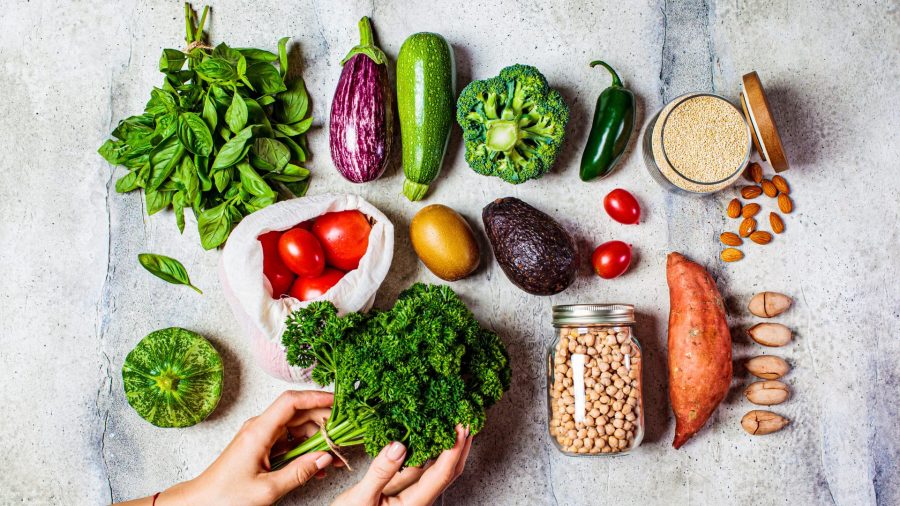3 Plant Based Beef Recipes That Will Impress Even Meat Lovers
3 Plant Based Beef Recipes That Will Impress Even Meat Lovers
Blog Article
Everything About Healthy And Balanced Food: Benefits of Checking Out Plant Based Options
The discussion surrounding plant-based diet plans has gained substantial focus in recent times. Numerous individuals are checking out the possible health advantages, dietary benefits, and ecological effects associated with these dietary selections. As individuals come to be extra mindful of their food's impact on wellness and sustainability, concerns arise regarding the functionalities of adopting such a way of living. What specific changes can one anticipate, and just how might these choices improve not just personal health however additionally the world's future?
Recognizing Plant-Based Diets
Lots of individuals connect plant-based diet plans mostly with vegetarianism or veganism, these diet plans can include a wide range of consuming patterns that prioritize entire, minimally processed plant foods. Such diet plans typically include fruits, vegetables, entire grains, nuts, seeds, and beans, while getting rid of or restricting pet items. This adaptability allows people to tailor their nutritional choices according to nutritional requirements and personal preferences. Some might adopt a mostly plant-based diet while still occasionally consuming meat or dairy products, usually described as a flexitarian approach. The emphasis continues to be on integrating more plant foods, which can lead to a varied selection of dishes and tastes. Comprehending these different interpretations of plant-based eating is important for appreciating its availability and appeal in contemporary food culture.
Wellness Advantages of Plant-Based Foods
The health and wellness benefits of plant-based foods are significant, providing a nutrient thickness advantage that sustains general well-being. Research shows that these foods can improve heart wellness and play an essential function in reliable weight administration. By including more plant-based choices, individuals might enhance their dietary options and promote long-lasting health.
Nutrient Thickness Advantage
Nutrient density plays a vital role in the health and wellness benefits of plant-based foods, making them a compelling option for those seeking a well balanced diet regimen. Plant-based foods, such as fruits, veggies, legumes, nuts, and entire grains, are frequently rich in important vitamins, minerals, and antioxidants while being reduced in calories. This high nutrient density allows people to eat less calories while still meeting their dietary needs. Additionally, these foods are packed with dietary fiber, advertising digestive system wellness and aiding in weight administration. By integrating nutrient-dense plant-based options, consumers can improve their general wellness, sustain their body immune systems, and reduce the threat of persistent diseases. Inevitably, the nutrient thickness of plant-based foods emphasizes their value in a health-conscious lifestyle.
Heart Wellness Enhancement
Weight Management Assistance
In addition to advertising heart wellness, a plant-based diet can substantially assist in weight monitoring. This nutritional approach stresses whole foods such as fruits, veggies, beans, nuts, and whole grains, which are generally lower in calories and higher in fiber compared to animal-based items. The high fiber web content aids increase satiety, minimizing general calorie consumption. Plant-based diet plans are typically abundant in vital nutrients while reduced in undesirable fats, making it less complicated to preserve a healthy weight. Research study shows that people that embrace a plant-based lifestyle tend to have reduced body mass indexes (BMIs) and experience more effective fat burning contrasted to those that consume meat-heavy diet regimens. Welcoming plant-based options is a critical option for effective weight monitoring.
Nutritional Worth of Plant-Based Active Ingredients
Plant-based components are rich in necessary nutrients, offering a diverse array of vitamins, minerals, and anti-oxidants that add to general wellness. A comparison of protein resources exposes that while animal items are typically considered as exceptional, many plant-based choices supply appropriate protein and various other helpful substances. Recognizing the dietary value of these ingredients can aid people make informed nutritional choices.
Essential Nutrients in Plants
Nutrient-rich ingredients located in plants use a diverse array of crucial vitamins and minerals that contribute substantially to total health. These active ingredients are abundant in vitamins A, C, and K, which sustain immune function, vision, and blood clotting, respectively. Furthermore, plants supply essential minerals such as magnesium, potassium, and calcium, crucial for heart health and wellness, muscle feature, and bone toughness. The visibility of fiber in plant-based foods aids food digestion and promotes a healthy and balanced intestine microbiome. Anti-oxidants, located generously in fruits and veggies, assistance battle oxidative tension and decrease swelling. Lots of plant foods are low in calories yet high in nutrients, making them a superb selection for those seeking to preserve a healthy weight while making certain excellent nutrient consumption.

Contrasting Healthy Protein Sources
Healthy protein sources vary significantly in their nutritional accounts, with plant-based ingredients offering distinct benefits. Unlike animal proteins, which frequently have saturated fats and cholesterol, plant healthy proteins have a tendency to be lower in these unhealthy elements. Legumes, nuts, seeds, and whole grains are abundant in vital amino acids, fiber, vitamins, and minerals. For circumstances, lentils offer high healthy protein content alongside substantial iron and folate, while quinoa is a total protein, supplying all nine crucial amino acids. In addition, plant-based proteins are usually gone along with by anti-oxidants and phytochemicals that support overall health. The change to plant-based healthy protein sources not just boosts dietary consumption but also aligns with lasting dietary techniques, decreasing ecological impact and promoting lasting health and wellness benefits.
Environmental Influence of Plant-Based Eating
As recognition of environment modification grows, lots of individuals are exploring sustainable dietary options that can greatly lessen their environmental impact. Plant-based eating has actually become a substantial contributor to minimizing greenhouse gas emissions, additional info which are primarily associated with animals manufacturing. The farming of fruits, legumes, vegetables, and grains commonly calls for less sources, such as water and land, compared to animal farming. Furthermore, plant-based diet plans can bring about decreased logging, as much less land is needed for grazing livestock or growing pet feed. By changing towards plant-based choices, consumers can support biodiversity and promote healthier environments. Generally, accepting plant-based eating not just benefits personal health and wellness however also represents a vital action towards environmental sustainability and preservation efforts.
Conquering Common Misconceptions
While many people identify the advantages of a plant-based diet, several misunderstandings usually prevent them from fully accepting this way of living. A typical belief is that plant-based diets do not have enough healthy protein; however, various plant resources, such as vegetables, nuts, and tofu, offer adequate healthy protein. Furthermore, some think that this diet plan is pricey, when as a matter of fact, staples like beans, rice, and seasonal veggies can be rather cost effective. One more mistaken belief is that plant-based consuming is excessively restrictive, whereas it actually provides a varied variety of tastes and foods. Finally, several fret that a plant-based diet might lead to shortages, yet with proper planning, individuals can obtain all essential nutrients, consisting of minerals and vitamins, while taking pleasure in a wide array of tasty meals.
Tips for Transitioning to a Plant-Based Way of life
Making the change to a plant-based way of life can be an improving experience, though it commonly calls for some assistance to navigate the initial changes. First, individuals are urged to start progressively, incorporating even more fruits, vegetables, legumes, and entire grains right into their meals while decreasing meat and milk consumption. Dish preparation is vital; preparing a weekly menu can assist alleviate the adjustment and prevent final unhealthy choices. Discovering cooking techniques and brand-new recipes can also boost the experience and preserve exhilaration regarding plant-based consuming. In addition, signing up with support teams or communities can supply inspiration and share important tips. Finally, remaining notified regarding nutrition warranties well balanced meals, stopping shortages while promoting a healthy and balanced, satisfying plant-based lifestyle.
Delicious Plant-Based Meal Ideas
Checking out tasty plant-based dish concepts can motivate individuals to accept a more nutritious diet. One prominent option is a hearty quinoa salad, anchor featuring cherry tomatoes, cucumber, and a vibrant lemon-tahini dressing. Another favorite is a mouthwatering lentil stew, loaded with carrots, celery, and great smelling natural herbs, best for a comforting dinner. For morning meal, overnight oats made with almond milk, chia seeds, and covered with fresh berries supply a nourishing beginning to the day. Additionally, a dynamic vegetable stir-fry with tofu and a selection of colorful veggies can be a fast yet satisfying meal. Lastly, luscious avocado salute on whole-grain bread, sprayed with spices and seeds, provides a basic yet savory snack. These dishes showcase the variety and splendor of plant-based consuming.

Frequently Asked Inquiries
Can a Plant-Based Diet Plan Offer Enough Protein?
The question of whether a plant-based diet plan can provide enough protein is usual. Many sources, consisting of vegetables, nuts, seeds, and entire grains, can meet healthy protein requires effectively, sustaining a balanced and healthy diet plan for people.
Are Plant-Based Diets Appropriate for Children?
The viability of plant-based diet plans for kids depends upon mindful planning. Sufficient nutrients need to be guaranteed, including vitamins, minerals, and healthy proteins. With proper support, such diet plans can sustain healthy and balanced growth and development in youngsters.
Just how Do I Eat Out on a Plant-Based Diet?
Dining out on a plant-based diet includes looking for restaurants with diverse food selections, asking for alterations, and checking out vegan-friendly alternatives. Planning in advance and connecting dietary choices can improve the eating experience while maintaining nutritional selections.
What Are Usual Allergens in Plant-Based Foods?
Common irritants view website in plant-based foods consist of soy, gluten, nuts, and seeds - Plant Based Beef. People complying with a plant-based diet plan ought to know these irritants and review tags thoroughly to stay clear of adverse reactions and assure safe usage
Can Plant-Based Diets Assist With Weight-loss?
Study suggests that embracing a plant-based diet regimen may assist in fat burning as a result of its commonly lower calorie density and higher fiber material. This combination can enhance satiety, helping individuals handle their caloric intake effectively. Several individuals link plant-based diet regimens mainly with vegetarianism or veganism, these diets can include a broad variety of eating patterns that focus on whole, minimally processed plant foods. Nutrient density plays a necessary function in the wellness benefits of plant-based foods, making them an engaging option for those seeking a well balanced diet. Plant-based diets have been shown to noticeably boost heart health, as they often have elements that sustain cardiovascular feature. In addition to promoting heart health and wellness, a plant-based diet regimen can substantially assist in weight monitoring. A common idea is that plant-based diets lack enough protein; however, many plant resources, such as beans, nuts, and tofu, offer enough protein.
Report this page